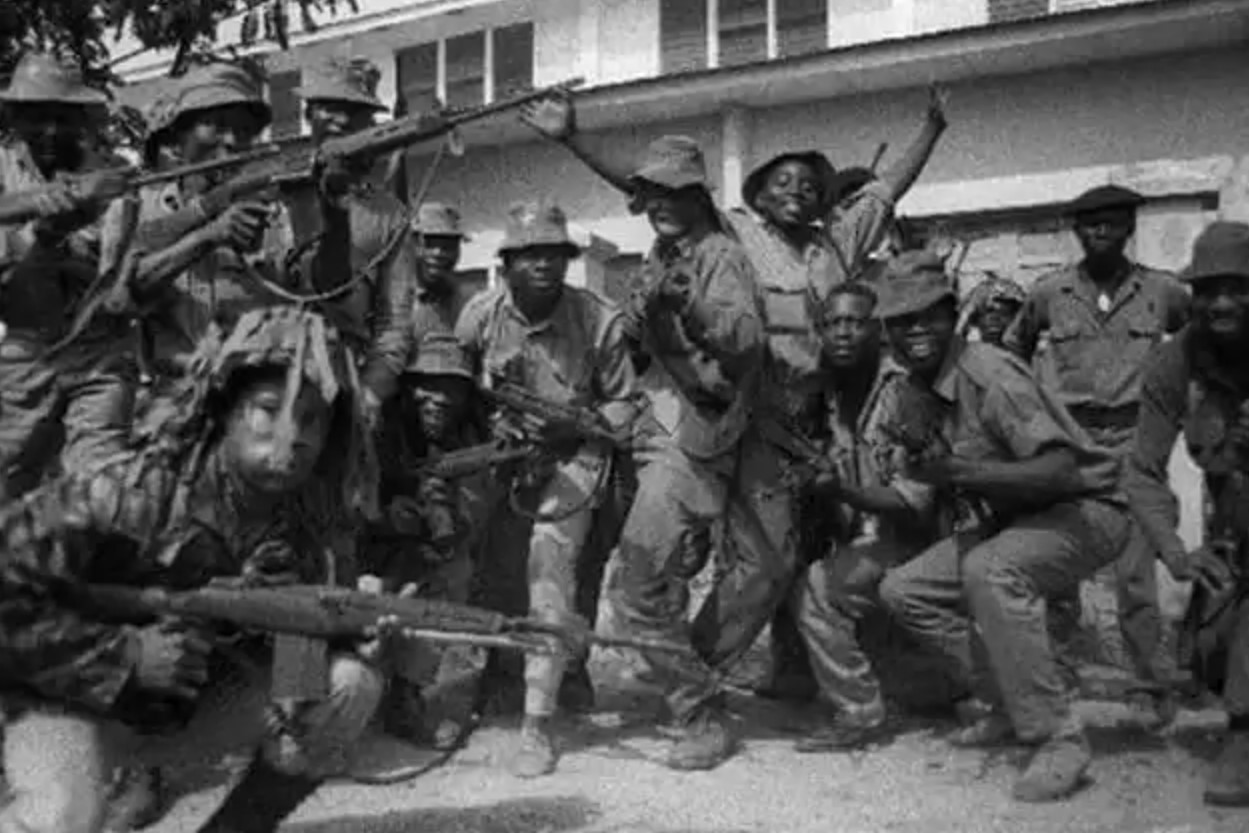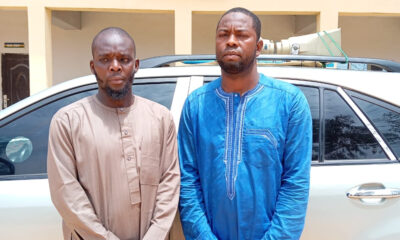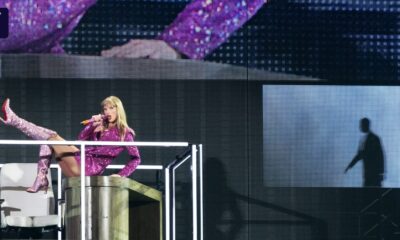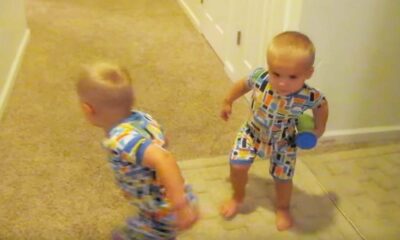METRO
Slogans, Nicknames and Operational Names Associated with the Nigerian Civil War
Published
9 months agoon
By
1oo9t
| Nickname, Slogan, Local Name or Operational Name | Definition/Meaning |
| A | |
| Agbekoya | Yoruba term for “old peasant farmer.” The tax revolt of the “old farmers” proved to be a serious internal security issue during the war. |
| “Ahiara” Declaration | Modelled after Tanzania’s Arusha declaration, Ojukwu issued this ‘Biafran revolutionary’ declaration on June 1st, 1969 ostensibly to address nepotism and corruption within the Biafran military and society. |
| “Air Raid” | Nickname for Biafran Colonel Joe Achuzia, acquired during the attempt to retake Okigwe in late 1968. |
| Ojuku soja | Nickname for Biafran troops among illiterate and semi-illiterate Nigerian soldiers. It stands for “Ojukwu’s soldier.” The term “soja” has entered mainstream use in Nigeria. |
| Alalaba tactics | Alalaba means “sneaking” in Hausa. Designed by then Major MJ Vatsa, it was an infantry method of tactically gaining ground on a Biafran armoured vehicle before destroying it at close quarters. |
| Annabelle | Operational code-name for Biafra’s Uli-Ihiala airstrip |
| Apollo Battalion | This was the nickname given to a 3rd Marine Commando self-contained independent Divisional reserve battalion created by Colonel Obasanjo after the landing of Apollo 11 on the moon in July 1969. It was used in a “fire brigade” role as a “special forces” raiding unit. It was, therefore, similar to Ojukwu’s “Umuahia Brigade” and may well have been inspired by it. |
| Araba | Araba in Hausa means to separate. The term first appeared on placards carried by rioters in Bauchi in May 1966 after the promulgation of the ill-advised Unification decree #34. That is why the May riots, which quickly spread to other towns in the north, are sometimes called the araba riots. |
| Atomati | Nickname for “automatic weapon” among illiterate Nigerian soldiers. |
| B | |
| “Baba” | Used fondly, this was the nickname for Lt. Col. David Ogunewe, the last Commander of the 1st battalion in Enugu before the outbreak of the war. He played a critical role in containing tension between northern and eastern soldiers during the July 29 northern counter-coup. |
| “Basha” | Federal Nigerian nickname for temporary makeshift billets (tents) constructed for troops using zinc sheets or tarpaulin. The term survived the war and is still in use. |
| “Biafra Gin” | Homemade Biafran Incendiary weapon produced by the Chemicals and Materials Workshop subsequently subsumed under the Research and Production (RAP) Organization. Used against federal personnel, defensive positions and armoured vehicles. |
| ‘Black Eagle’ | Nickname for Colonel Hubert Julian (Biafran mercenary) |
| ‘Black Jack’ | Nickname for Col. Jean Schramone (Biafran mercenary) |
| ‘Black Scorpion’ | Nickname conferred by foreign correspondents on Colonel Benjamin Adekunle, Commander of the Federal 3rd Marine Commando Division |
| “BOFF” | Acronym for Biafran Organization of Freedom Fighters. Colonel Aghanya led it. |
| ‘Boozy Bonzo Bond’ | Nickname for a South African mercenary who flew jets for the Federal Nigerian AirForce, drank whiskey while flying and liked to fly his aircraft back riddled with bullet holes – as evidence. |
| “Bottoms” | Residue of Biafran fuel refining process which was then used as fuel oil |
| The “Brave” | Nickname for Armand Iaranelli, a Corsican mercenary fighting for Biafra |
| C | |
| Corporal Nwafor | Named after the Biafran soldier that captured it, the nickname ‘Corporal Nwafor’ was bequeathed to a federal Nigerian Army Saladin armoured vehicle captured from the federal 2DIV during one of several Biafran attempts to retake Onitsha. ‘Corporal Nwafor’ was recaptured by federal troops of the 3MCDO during the unsuccessful Biafran attempt to retake Ohoba in July 1969. |
| D | |
| Exercise Damisa | Damisa is the Hausa word for “Leopard”. Code-name for the Kaduna component of the January 15, 1966 mutiny |
| Delfin | Czech L-29 armed fighter jet/trainer used by Federal Nigerian Air Force |
| “Doctor Wise” | The nickname of a Biafran spiritualist who wielded great (and controversial) influence over military operations, particularly in the latter stages of the war. He was a kind of Rasputin for many elements of the Biafran political and military leadership. The use of juju men and spiritualists was common to both sides during the war and remains a common practice in modern Nigeria. |
| E | |
| F | |
| “Final Offensive” | Nigeria launched many unsuccessful “final offensives” during the war until the real final offensive of December 1969/January 1970. The term became an object of scorn on Biafra radio. |
| “FOB” | Acronym for ‘Forward Operating Base’. This was a term used by the Federal Nigerian Air Force for bases located in Makurdi, Benin, Calabar and Lagos. |
| ‘Foot cutter’ | A type of homemade Biafran mine |
| G | |
| Operation “Giwa” | Giwa is the Hausa word for elephant. This so-called operation was alleged as the final act in the complete Igbo take-over of the country in 1966 after the execution of Operations Damisa, Kura, and Zaki. The existence of such an operation has never been independently confirmed. Nevertheless, such propaganda was widely disseminated in certain northern circles and may well have been believed. |
| “Genocide” | Call-sign/code-name for a South African mercenary who flew for Biafra Also the nickname for a homemade Biafran armoured vehicle used during the battles for Ikem and Obollo Eke in 1967. Federal forces destroyed it. |
| “Genocide Squadron” | Biafran nickname for Federal Nigerian Air Force IL-28 Bombers, converted DC-3s and DC-4s at the Benin City Forward Air Base in the Midwest. |
| “Go on with One Nigeria” | Federal Nigerian wartime slogan created from the alphabets in GOWON. |
| ‘Good morning’ artillery barrage | Biafran nickname for highly predictable Federal Nigerian Army harassing artillery fire aimed at nobody in particular, usually the trees and bushes, but occurring at exactly the same times every morning. Used as an “alarm clock” by Biafran units. |
| ‘Gowon’s Boots’ | Biafran nickname for swelling of both feet caused by Kwashiorkor – resulting from wartime protein malnutrition. |
| ‘Guitar Boy’ | Nigerian nickname for the Soviet AK-47 automatic rifle. Likely related to the curved shape of its ammunition magazine and the unique sound it makes when switched from full automatic mode to semi-automatic grouped shots of three rounds each. |
| Gwodo-Gwodo | Biafran nickname for very huge “Nigerian” soldiers suspected (but never confirmed) to be of Chadian origin |
| H | |
| ‘Hannibal’ | Nickname for Biafran Colonel Joe Achuzia, acquired after the Federal Nigerian Army Abagana disaster. Inspired by Carthaginian General Hannibal who defeated Roman troops at Cannae. |
| Lord “Haw-Haw” | Federal nickname for Okokon Ndem, a minority easterner who nevertheless, worked as a highly effective Biafran radio propagandist. Biafran radio also used the same nickname for Mr. Ukpabi Asika, a pro-federal Igbo intellectual who was appointed on October 27, 1967 by General Gowon as Administrator of the East-Central State. The term dates back to the Second World War. ‘Lord Haw-Haw’ was the name British radio fans called William Joyce, an American born British man with an English mother and Irish-American father. He had nazi sympathies and worked for Goebbels as a German weekly radio broadcaster. The British hanged him for treason in 1946. |
| I | |
| ‘Intruder’ | Biafran nickname for a specific Federal Nigerian Airforce Ilyushin IL-28 Russian bomber based at the Benin City Forward Air Base in the Midwest. By flying at altitudes above 10,000 feet, usually at night, it avoided Biafran ack-ack and homemade ground to air rockets. It was part of the so-called “Genocide Squadron.” The Intruder was destroyed on the ground in May 1969 during Count Von Rosen’s Operation Biafra Baby |
| “Ironside” | British nickname for Major General JTU Aguiyi-Ironsi, first GOC Nigerian Army and first military Head of State of Nigeria. Killed during the northern counter-coup of July 1966. |
| J | |
| “Jack” | British nickname for General Yakubu Gowon. Derived from YAKUBU. |
| “Jet” 22 | Federal nickname for the 22 Battalion under Major Abdullai Shelleng in the Nsukka sector of the 1st Infantry Division. The name was acquired on the basis of a sitrep Shelleng sent back to 1DIV HQ stating that he had advanced with “jet speed” after successfully catching up with his fellow 21 and 5 battalions during the drive towards Opi junction. Both sister battalions had originally left him behind in Nsukka while he was awaiting weapons, ammo and support units. |
| “Jet 77” | Biafran propaganda company attached to the “S” Division when it was under command of Lt. Col. Onwatuegwu. |
| K | |
| “Kaduna” | One of the middle names of Major Patrick Chukwuma “Kaduna” Nzeogwu, leader of northern operations during the January 15, 1966 mutiny. |
| ‘Kamikaze Brown’ | Nickname for a Czech mercenary pilot called Brown who piloted Biafra’s B-26 bomber until it was destroyed on the ground at Enugu airport. |
| Operation “Kura” | Kura is the Hausa word for Hyena. This was the alleged Igbo operation to eliminate northern traditional rulers at Ibadan on July 28, 1966, as a follow-up to “Damisa.” The existence of such an operation has never been independently confirmed. Nevertheless, such propaganda was widely disseminated in certain northern circles and may well have been believed. |
| L | |
| “Land Army” | A subgroup of the Biafran “Science Group” dedicated to the production of food under economic blockade. |
| M | |
| “Mad Mike” | Nickname for Col. Mike Hoare (Biafran mercenary) |
| “Marshals” | Extra-large, homemade, Biafran multiple mine throwers |
| “Monty of the Midwest” | Drawing inspiration from Britain’s Field Marshall Montgomery of Alamein, this was a nickname for Federal Nigerian Lt. Col. Murtala Mohammed, Commander of the 2nd Infantry Division on account of his successful campaign to contain and evict Biafran forces from that region in 1967. |
| N | |
| “Na Cinema” | Nickname for Colonel Benjamin Adekunle, mainly used among his people, the Yoruba. |
| “Ndidi” | Biafran nickname meaning “patience.” It was given to a captured Federal Nigerian Army Armored Personnel Carrier at Uzuakoli. |
| “No Victors; No Vanquished” | Federal Nigerian Wartime slogan, particularly after the war |
| O | |
| Ogbunigwe | Very deadly homemade Biafran multipurpose bomb produced by the Weapons and Equipment Workshop subsequently subsumed under the Research and Production (RAP) Organization. Ogbunigwe was based on the physics of the “Monroe” effect. It killed and maimed by wave effect percussion and dispersal of shrapnel. It was shaped either as a cone or cylinder and could be used as a land mine, a ground to ground projectile against troop concentrations or ground to air anti-personnel “air burst” cluster bomb. |
| “Oguta Boy” | Biafran nickname for a Nigerian Panhard armoured vehicle captured at Oguta in September 1968. The vehicle was later destroyed using “Alalaba” by elements of the Federal Army 21 Battalion under Major Vatsa during the battle for Uzuakoli in April 1969 |
| Operation ‘Aure’ | Aure is the Hausa word for “marriage”. When planning for the northern counter-coup of July 1966, conspirators in southern Nigeria made coded reference to it by talking about “Paiko’s wedding”, Paiko being the nickname for (and hometown in Niger Province of) Lt. Garba Dada, a northern subaltern at the 4th battalion who was to be the spearhead. |
| Operation Biafra Baby (Babies) | Biafran mercenary Count Von Rosen’s Minicon air raids against Federal Nigerian AirForce aircraft at Port Harcourt, Enugu and Benin airports on May 24 and 25, 1969. Later on, raids were carried out against oil and shipping facilities at Port Harcourt, Sapele, Warri and Forcados. |
| Operation Do or Die | Biafran offensive in late October 1969 to reopen the route to the Otuocha food-producing area between Onitsha and Abagana. This was a direct response to the Federal Operation ‘Finishing Touch’ |
| Operation ‘Finishing Touch’ | Federal Nigerian Army HQ offensive launched in October 1969 to break the stalemate of ‘trench warfare’ that characterized the preceding months. |
| Operation Hiroshima | Unsuccessful Biafran offensive to retake Onitsha in November 1968 |
| Operation ‘Kinshasha Special’ | Alleged coup attempt uncovered on September 21, 1967 against Biafran leader Emeka Ojukwu by Colonel [Brigadier] Banjo, [Major] Alale, Major [Lt. Col.] Ifeajuna and [Major] Sam Agbamuche. All four men were executed within four days after a court-martial. Ojukwu claimed in his diary that Ifeajuna was seen coming out the premises of the British High Commissioner and that Banjo had thousands of pounds given to him by the British, and that British-paid saboteurs were indoctrinating Biafran troops in the trenches. He later accused Banjo of deliberately withdrawing from Benin in the wake of Lt. Col. Mohammed’s 2DIV offensive. |
| Operation Leopard | Federal Nigerian Army 1st Infantry Division military offensive to take Umuahia in March and April 1969. Umuahia was then the capital of Biafra. |
| Operation Mabel | French Secret Service airlift operation directed by Jacques Foccart to supply Biafra with weapons (It began in September 1968, after an earlier public declaration on August 1st that France was in support of Biafran “self-determination”) |
| Operation OAU | Federal Nigerian Army Offensive of September 1968 launched by 3MCDO Commander, Colonel Benjamin Adekunle. Originally announced by Adekunle on July 30 at an international press conference. It was aimed at the near simultaneous capture of Owerri, Aba and Umuahia by Independence day October 1st 1968. Intended as a “present” for Nigeria’s Head of State, it ended in disaster. |
| Operation Tailwind | Final Federal Nigerian Offensive of the war, launched in December 1969 by 3 Marine Commando Division under Colonel Olusegun Obasanjo. |
| Operation Tallman | “Final” Federal Nigerian AHQ Offensive of August 1968 |
| Operation Tiger-Claw | Federal Nigerian 3MCDO Offensive led by Colonel Adekunle to take Calabar in October 1967. |
| Operation Torch | Biafran invasion of the Midwest, August 9, 1967. Colonel Victor Banjo led the 101 Division. The same code-name appears to have been used for the unsuccessful Biafran offensive in September 1967 to retake Nsukka. |
| Operation Unicord | Code name for federal strategic effort to keep Nigeria united. The term was originally used in an operational order by 1 Area Command dated July 2, 1967. |
| Ore | Better known as a rest and recreation stop for road travellers, this small junction town inside then Western State (now Ondo State) was the site of a decisive battle on August 23, 1967. There are historians who consider that battle (“The Battle of Ore”) the turning point in the Nigerian Civil War. |
| P | |
| “Paddy” | Nickname for an Irish mercenary fighting for Biafra |
| “Paiko” | Paiko is a name of a town in Niger State. However, it was often used to refer to Lt. Garba Dada, adjutant of the 4th battalion Ibadan in July 1966. He was one of the stormtroopers during the northern counter-coup. |
| “Papa” | Nickname for then Commodore J. E. Akinwale Wey, Federal Nigerian Chief of Naval Staff during the war. |
| “Police action” | Initial public description of “Operation Unicord”, the 1 Area Command federal offensive launched at 5am on July 6, 1967 by Colonel Mohammed Shuwa, then ‘Northern Front’ Commander, Major Martin Adamu, then ‘Ogoja Sector’ Commander, and Lt. Col. Sule Apollo, ‘Nsukka Sector’ Commander. OP UNICORD was supported by ‘southern front’ operations led by Lt. Col. Benjamin Adekunle. Major General Gowon first publicly used the term “Police action” in a Press Conference on July 13, 1967, in which he said inter-alia, “I must emphasize that this is not a civil war. It is not an attempt to crush the Ibos. It is a police action restricted to the purpose of bringing down the Ojukwu regime…” The phrase was, however, discarded when, on August 11, 1967, in reaction to the Biafran invasion of the Midwest, Gowon declared “total war.” |
| Q | |
| “Quisling” | Another Biafran radio nickname for Ukpabi Asika. [Derived from the name of the Norwegian Minister who served the Nazis during the Second World War]. |
| R | |
| RAP | Acronym for Biafran “Research and Production” Organization. This organization brought together and coordinated the efforts of different science groups focusing on Airports and roads, chemicals and materials, Heavy equipment and industrial materials, weapons production, biological processes, fuel refining, rocketry, explosives, electronics and essential foods. |
| Rebels | Name frequently used by federalists to describe Biafran troops and the Biafran leadership. |
| “Red Devil” | Biafran homemade Armored vehicle adapted from tractors and other earth-moving equipment or captured or old vehicles. Produced by the Heavy Equipment and Industrial Materials Group. |
| “ROB” | Biafran pneumonic for “Republic of Benin”, the republic declared in the Midwest State on September 20, 1967 by Major Albert Okonkwo, acting on behalf of Ojukwu. It was a last ditch effort to win support from the minority ethnic groups in that State by purporting to change its “status” as Biafran “Occupied Territory” to one of an independent nation. Less than 24 hours later the “ROB” collapsed when federal troops took Benin City, its capital. The 101 Division, which originally invaded the State under Colonel Banjo on August 9, 1967, was later renamed the “ROB” Division. Under Colonel Achuzia, it carried out numerous raids into the Midwest in 1968 and 1969 from across the River Niger. |
| S | |
| “Sabo” | Nickname for “saboteur”, a common Biafran tendency, encouraged by the Ojukwu regime, to refer to any Biafran commander who lost a battle to federal forces irrespective of the odds. Virtually all senior Biafran commanders (except General Odumegwu Ojukwu) were branded saboteurs at one point or another. The custom began after the disastrous withdrawal of the Biafran 101 Division from its ill-fated Midwest campaign of 1967. |
| “S” Brigade | “S” stood for “Special”. It was a Brigade originally conceived as a personal protection force for Biafran leader Ojukwu, with direct reporting relationship to him, outside Biafran Army control. This created a lot of envy and operational problems. |
| “S” Division | When the Biafran “S” Brigade was expanded to Division size it became known as the “S” Division. |
| “Shettima” | Nigerian nickname for the Spanish CETME automatic rifle – a variant of the Gewehr 3 (G3) German rifle. [Shettima is a real northern name, particularly in the northeast among the Kanuri. It appears its phonologic similarity to CETME led to its adoption as the local name of that rifle]. |
| ‘Shore Battery’ | Biafran homemade weapon system. It was a combination of many different weapons including Ogbunigwe, conventional bombs, rockets etc. set up together for mass effect, electronically connected in series along coastlines and detonated in predetermined sequences. The idea was to make casualty evacuation, retreat and tactical dispersal extremely hazardous from secondary detonations. |
| “Show Boy” | Nickname shared by Federal Lt. Cols. Abdul D.S. Wya and Sotomi. It is not entirely clear why they were called “Show Boys” |
| T | |
| “Taffie” or “Taffy” | Nickname for a South African mercenary (Major Williams) fighting for Biafra along with Steiner. Some say he was of Welsh origin. |
| “Tel” | An important chemical used in petroleum blending by the Biafran Refinery and Fuel Group |
| “Thunder Division” | Name given (by Ojukwu) to detachment of the “S” Division that took part in the siege of Owerri |
| ‘Tiger’ Battalion | Interestingly, both Nigerian and Biafran units used this nickname. The Nigerian 82 Battalion under Major Ibrahim Bako at Uzuakoli was nicknamed the “Tigers.” Similarly, there was a “Tiger” Battalion in the 66 Brigade under Major Osuagwu during Biafra’s Operation Do or Die. |
| “To keep Nigeria one is a task that must be done” | Federal Nigerian wartime slogan |
| “Tortoise Division” | Federal Nigerian Army HQ nickname for its 2nd Infantry Division – which made very little progress after March 1968. |
| “Twiggy” | Nickname for Jack Mulloch |
| U | |
| Umuahia Brigade | Nickname for Colonel Ojukwu’s special reserve force based at Umuahia under Major Njoku. |
| Uzuakoli Boy | Biafran nickname for a recommissioned Federal Army Ferret armoured vehicle captured at Uzuakoli |
| V | |
| Vandals | Name frequently used on Biafra radio to describe federal forces. |
| W | |
| X | |
| Y | |
| “Yellow Bar” | Nickname for a Federal Nigerian Air Force mercenary Pilot |
| “You are keeping Unity between us” | Federal Nigerian wartime slogan derived from YAKUBU, Major General Gowon’s first name. |
| Z | |
| Operation “Zaki” | Zaki is the Hausa word for Lion. This was the alleged Igbo inspired ethnic cleansing operation against the North to follow-up ‘Operation Kura’ in 1966. The existence of such an operation has never been independently confirmed. Nevertheless, such propaganda was widely disseminated in certain northern circles and may well have been believed. |
Thanks for reading, SOURCE OldNaija.com READ FULL STORY HERE>>>CLICK HERE TO CONTINUE READING>>>
Related
You may like
METRO
Woman mourned the death of her husband at his funeral ‘only to find him at her doorstep 4 days later’!
Published
3 days agoon
March 31, 2025By
1oo9t
The unfortunate woman, Victoria, told local news outlets that she ended the year with a tragedy. During a visit to the local hospital, she was told by hospital staff that her husband, Julio, passed away from c0ronavirus.
She reportedly identified the body that she was shown in the hospital morgue, after which the medical staff released the corpse to the grieving wife.
Making arrangements to pay the last respects to her husband, Victoria, arranged to have Julio’s body be taken 30 miles away from the hospital to her village in Honduras.
She then spent one entire night surrounded by distressed relatives as they had an all-night wake before his final burial the next day…Click Here To Continue Reading>> …Click Here To Continue Reading>>
On the day of the funeral, Julio’s children saw the open coffin and found something amiss. They took a look at the body and wondered whether it was really that of their father’s.
But despite their doubts, the relatives reportedly went ahead with the ceremony and the man was laid to rest in a funeral that Victoria spent more than $430.
In the days that followed, Victoria continued grieving for her husband until, out of nowhere, she saw Julio himself arrive back at their house on the fourth day since the funeral was held.
“That wasn’t my husband who died, because I have my husband here now. I recognised him,” the wife said, as quoted by the Daily Mail.
It was only after her husband returned home that Victoria discovered he had been missing for a few days because he went for a walk and fell over at a spot in the neighboring municipality.
Unable to get up, the man spent several days there, surviving without anything to drink or eat. He was later found injured in a field before his return home. Although her husband was back, it also meant that she buried a complete stranger in her village and her family has no idea who they were grieving for. READ FULL STORY HERE>>>CLICK HERE TO CONTINUE READING>>>
“I would like them to give me back some of what I spent, because they gave me the body of someone I don’t know,” Victoria shared.
“The authorities at the morgue should have properly examined him to see if it was really him.”
But on the other hand, the hospital said that the wife was to blame for misidentifying the man as her husband. They confirmed that the man arrived with Covid-19, and because of his serious condition, he didn’t survive in the hospital for more than a few hours.
The hospital staff had a look at the picture Victoria was carrying of her husband, and they found him to resemble the body of the man in the morgue. In addition to this, Victoria herself recognized the body at the time as that of her husband’s.
The hospital director reportedly said, “The logical thing was to bring the body back so we could investigate.
But later the relatives called back and said he was the right person after all and they were going to bury him.
We have everything documented. We even have an apology from one of the children, if this becomes a lawsuit.”
Related
METRO
A Girl Rushed Out Of McDonald’s Bathroom Crying, Then Her Mom Saw Something Wrong On Her Legs
Published
5 days agoon
March 29, 2025By
1oo9t
The restaurant was packed with hungry customers busy eating at their tables when the customers’ attention shifted to a four-year-old girl named Kayla running towards her mom. Kayla’s face was filled with tears, and she was hysterically crying when she reached her mom’s arm. While Kayla’s mom, Nicole, was comforting her daughter, she asked her daughter what was wrong. Kayla was still crying and couldn’t speak; she continued sobbing like she was in deep pain. That was when Nicole started scanning her daughter’s body and saw what was wrong.
There was something on Kayla’s leg. Hello, wonderful people! I’m Jamie Buck from Wonderbot, and here is a story about a girl who rushed out of a McDonald’s bathroom crying. Then her mom saw something wrong on her legs. Before we begin, make sure you smash the like button, subscribe to our channel, and click the notification bell for more amazing videos…Click Here To Continue Reading>> …Click Here To Continue Reading>>
It was during New Year’s Day when Nicole and her daughter Kayla decided to spend their day at the park and buy some food at McDonald’s. It was Kayla’s favorite fast food. The two were so excited to spend time together and bond at the park. While Nicole was closing their front door, she turned to Kayla and asked her if she was ready to have fun. Kayla nodded her head with excitement, having no idea what was about to come to them.
When Nicole and Kayla arrived at the park, the piercing sun was shimmering down on them. It was a perfect bright day to spend at the park. Kayla immediately ran towards the roundabout and asked her mom to spin her. You could hear Kayla’s giggle throughout the playground while her mom was spinning her. Nicole’s phone started ringing, and she turned around to answer the call while Kayla got off the roundabout to go to the slides.
While Nicole was busy talking on her phone, she suddenly heard a scream. Nicole quickly ended her call when she realized it was Kayla. The moment Nicole got off the phone, she turned around to find Kayla had fallen from the slide and scratched her head. She was so worried about what had happened and continued comforting her daughter while she was sobbing. After a while, when Kayla had finally calmed down, she asked her mom if she could get food already.
Nicole immediately stood up and told her daughter, “Yes, of course, dear.” The two left the park and drove off to the nearest McDonald’s, which was about 10 minutes away from where they were. Little did Nicole know that it would have been better if they just ate somewhere else. When Nicole and Kayla arrived at McDonald’s and walked into the restaurant, they noticed that the place was filled with people. Nicole’s attention was caught by a group of teenagers that were seated in the corner of the restaurant.
The group was listening to music while sipping on their soda. Two of the teenagers suddenly turned their look at Nicole and her daughter and sniggered. What could those two be thinking? It was mentioned earlier the restaurant was packed, so it’s no surprise that the line was long too. After what seemed like forever standing in line, it was finally Nicole’s turn to order.
While she was ordering their food, she asked Kayla to sit at the table in the corner and wait there while she was ordering food. Kayla politely followed her mom’s instructions and sat at the table while watching a video on YouTube on her mom’s phone. But then suddenly, a scream was heard throughout the restaurant. A scream came from the teenager that was sitting in the corner of the restaurant. The group started a fight and were yelling at each other.
Nicole immediately walked over to Kayla and comforted her, trying to drive her attention away from the battle by making her watch YouTube videos. Staff from the restaurant quickly went to the group to break up the fight and kick them out of the place. While the group was kicked out, two teenage girls from the circle were still sitting at the table. It was finally time to eat. The smell of burgers and fries lingered in the air as Nicole and Kayla started digging into their well-deserved lunch.
Kayla was eating a Happy Meal while Nicole was eating her chicken burger and some fries. In the middle of their mealtime, Kayla suddenly looked at her mom with a stern but innocent look. “Mommy, I need to use the toilet,” Kayla whispered as she finished the last bite of her cheeseburger. Kayla wiped her hands and got up to go to the toilet. When she walked over, she noticed the lock was shut.
There must be someone in there, she thought. She looked back at her mom, who smiled at her. Suddenly, she heard something. It was coming from inside the toilet. Giggles and laughs could be heard while Kayla was patiently waiting outside the toilet. READ FULL STORY HERE>>>CLICK HERE TO CONTINUE READING>>>
After a couple of minutes remaining, the door opened, and the two teenage girls from earlier went out of the bathroom together with a smirk on their faces. Nicole was intimidated by the girls as she watched them walk past Kayla. Nicole then signaled her daughter to enter the toilet and assured Kayla that she’ll stay outside and wait for her. While Nicole was patiently waiting for Kayla at her table, she heard a scream coming from the toilet. “Mom!
Kayla screamed while running out of the bathroom with tears streaming down her face. Nicole immediately stood up from her seat, not minding her bag that fell onto the floor. As a mother, one thing that you never want to hear is the sound of your kid screaming. Kayla ran into her mom’s arms, sobbing. In the toilet, she says, Nicole immediately went to the toilet to check what was wrong.
She scanned the whole room and thought there was nothing wrong there, so she continued studying to see what could be the reason behind her daughter’s outburst. She saw that there were a few toilet paper rolls rolled out on the floor, and the faucet was dripping. Nicole checked the toilet seat, and that is when she figured the reason for her child’s outburst. When she went to the toilet seat, she noticed that it looked like the chair was covered with a white sticky substance. But as Nicole got closer to inspect, she realized that it was glue.
The toilet seat was smothered with super glue. She then realized that someone did this on purpose. Nicole stormed out of the toilet while her heart was pounding and yelled to call the manager and all employees in the restaurant. Nicole went over to her daughter, who was still crying and yelling in pain. She checked on Kayla to see what was wrong and saw that her daughter’s skin was peeled off at the back of her legs.
While Kayla was still crying in her mother’s arms, Kayla was terrified of what happened, and her mother was furious. Nicole yelled out for help in the crowd while stopping her tears from falling out of her eyes. Joanna, the assistant manager at McDonald’s, thought that she had seen it all, from small fights over a Big Mac to a drunk customer and misbehaving teens. She was trained and was already used to handling heated situations. She knew what to do to solve problems, but in her 15 years in the industry, it was the first time to see and experience something like this.
She had never seen anything like this. The moment Nicole asked for help, Joanna and her co-employees all gathered around Kayla and provided medical assistance. The staff helped in cleaning the wound and bandaging her up while Kayla was crying in her mom’s chest. After that, Nicole decided to go to the nearest hospital, so she called a family member to come and get them. But the assistance that was given to them was not enough for Nicole.
She knew that there was something that she needed to do. Nicole took the matter to her social media account and shared on her personal Facebook what happened, hoping that this would bring the pranksters to justice. On her post, Nicole wrote, “To the two young blonde girls that thought it would be hilarious to put super glue on the disabled and baby changing toilet in McDonald’s, I just want you to know that I still have to console my four-year-old daughter who was unfortunate enough to use the toilet after your little prank. She is hoping that the two teenage girls who played the prank on her daughter would be found and punished. Kayla is just an innocent little girl and does not deserve all of this.
After some investigations, the two teenage girls were finally found and were interviewed by the police officers. The two girls immediately admitted what they did and sincerely apologized to Nicole and Kayla. The two girls said they were regretting what they did and that it was a prank gone wrong. But was the apology enough for Nicole and daughter Kayla? Imagine Kayla, a four-year-old who would have to live her life with this terrible memory marked in her mind.
After hearing that the police had taken appropriate action against the two teenage girls, Nicole felt relieved. It’s been weeks since the incident happened, and the things that happened that day are still fresh in her mind. She watches as her daughter peacefully plays with her dolls. Some justice finally, she thought to herself. She takes a sip of her cup of coffee before smiling to herself and watching her brave daughter playing.
Such a story right? This story just proves to show that pranks can be a fun way to trick your friends, but it can result in a bad scenario. Hopefully, Nicole and Kayla’s experience will remind those people who love doing pranks and tricks on their friends to think twice about the people they would upset all for the sake of a laugh. So next time you want to play a prank on someone, make sure to think about it first and that no one will get hurt.
Related
METRO
The bus driver picked up the children early in the morning as usual, and the parents found out they were not at school
Published
5 days agoon
March 29, 2025By
1oo9t
Black ice (a thin layer of new ice on a road) is dangerous. If you have ever tried to walk or ride it then you know.
This is why the parents of Shelby County were not surprised when they were informed that school would start late because they had to wait for the ice on the road to melt.
Unfortunately, bus driver Wayne Price did not receive the message on time. He had already collected all the children, and knew that returning them to their homes
would only increase the chance of an accident. So instead, he did something completely different…Click Here To Continue Reading>> …Click Here To Continue Reading>>
Instead of parking the bus and letting the kids play on the smartphone for two hours, he knew he needed to do something to keep them busy.
His actions may not have been according to the book, but they also did not surprise elementary school principals in Montevallo, Alabama.
Understand, they know Wayne. They know he is capable of doing such a ‘trick’.
But the children did not know what to expect. When they stopped at a local McDonald’s branch they must have wondered if Wayne had lost it. READ FULL STORY HERE>>>CLICK HERE TO CONTINUE READING>>>
Turns out he just wanted to buy all the kids breakfast, and paid for everyone’s breakfast instead of the breakfast they were supposed to eat at school.
To put things in perspective, there were between 40 and 50 kids on Wayne’s bus, so you can imagine how much the bill came out. School principals responded to the
gesture on Facebook and wrote: “Mr. Price, one of our bus drivers, really demonstrated the holiday spirit! On Tuesday, when school started late because of ice on the
road and we could not serve breakfast, he bought breakfast at McDonalds for all the kids who were on the bus! What a wonderful gesture that the students will
remember forever!”
After hearing every good deed of the bus driver, people from all over the world flooded Wayne with messages of support and encouragement.
What a beautiful thing to do, and what a wonderful way to do above and beyond for kids who he so obviously care about!
If you think Wayne Price’s deed is commendable, share the article with your friends and family!
Related
Trending
-

 IN-THE-NEWS10 months ago
IN-THE-NEWS10 months agoLexus SUV Stolen In Anambra Gets Recovered In Adamawa
-

 METRO7 months ago
METRO7 months ago9-year-old boy ‘whispered 7 chilling words to his mother’ who poisoned him by putting excrement in his IV drip!
-

 SPORTS9 months ago
SPORTS9 months agoLive ticker for Taylor Swift in Gelsenkirchen: Man sells tickets for 380 euros
-

 IN-THE-NEWS9 months ago
IN-THE-NEWS9 months agoNigerian Man Rewarded With Over N7.5 million For Returning $14K Mistakenly Sent to Him (Photo)
-

 HEALTH & LIFESTYLE10 months ago
HEALTH & LIFESTYLE10 months agoIf You Don’t Want Acne Or Pimples On Your Face Avoid These 6 Simple Mistakes
-

 METRO7 months ago
METRO7 months ago25 Superfoods for Rapid Fat Loss and Weight Drop! #8 is a Game Changer!
-

 METRO9 months ago
METRO9 months agoMother told them to ‘Get in bed’
-

 SPORTS9 months ago
SPORTS9 months agoJosh Hart’s Savage Tweet: “Messi would have made it” – Ronaldo’s Penalty Miss in Euro 2024 quarter-finals
